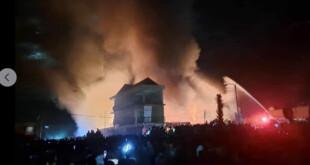Foreigners Shutting Down their Businesses in Ethiopia

By AFP,
Anti-government protesters in Ethiopia have turned their anger on foreigners, torching tourist resorts and foreign-owned factories in the restive Oromia region, local media reported Friday.
At least 11 companies, including textile and plastic factories, were torched in recent days in the town of Sebeta as well as about 60 vehicles, according to Fana, a state-controlled broadcaster, which blamed “anti-peace forces” for the attacks.
The Bishangari Lodge on the shores of Lake Langano south of the capital Addis Ababa, one of the main tourist destinations in Oromia, was among the premises set alight.
“The lodge is completely destroyed. 100 percent burnt down,” said a hotel employee who did not want to be named.
A Dutch fruit farm, AfricaJuice, was also ransacked this week in the south-eastern Awash Valley.
Oromo protesters blame foreign investors for occupying land appropriated from them by the government and said they have had enough.
“The people have been protesting peacefully for almost a year. They didn’t find any solutions from the government until now, but rather the killing has continued as we have seen at Ireecha festival,” said Barnabas, a protester in the town of Holeta who gave only his first name.
“This makes the people furious.”
The latest violence follows the deaths of more than 50 people in a stampede triggered by police firing tear gas at the Ireecha religious festival in Bishoftu, a town in Oromia, last Saturday.
On Tuesday, a US citizen was killed close to Addis Ababa when a rock thrown by protesters hit the vehicle she was travelling in. She was identified as plant biology researcher Sharon Gray, in a statement from California’s UC Davis University.
The UN on Friday called for an independent investigation into the violence, as government faces its most serious unrest since coming to power in 1991.
Such a probe was needed “to ensure accountability for this and several other incidents since last November involving protests that have ended violently,” Rupert Colville, a spokesman for the United Nations human rights agency, told reporters in Geneva.
Companies took our land
Protests began in Oromia in November and have since expanded to Amhara with human rights groups claiming several hundred killed so far in a crackdown on demonstrations.
Together, Oromos and Amharas make up 60 percent of the population of Ethiopia.
The protesters accuse the country’s leaders, who largely hail from the northern Tigray region, of monopolising power.
“The businesses are targeted because these are the companies that took the land from the farmers without giving enough compensation,” said Barnabas, who also complained that few locals get jobs at the foreign-owned companies.
“We are not getting benefits from them,” he said.




